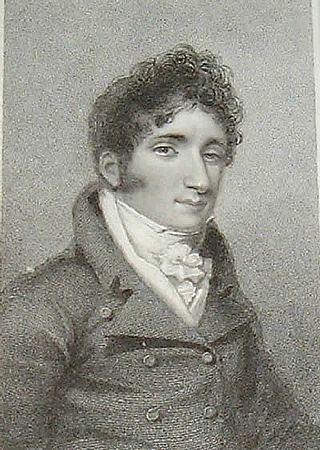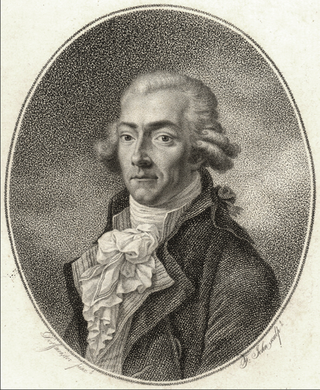Related Research Articles

Charles Bannister (1738–1804) was an English actor, comedian and singer.

Michael Kelly was an Irish tenor, composer and theatrical manager who made an international career of importance in musical history. One of the leading figures in British musical theatre around the turn of the nineteenth century, he was a close associate of playwright and poet Richard Brinsley Sheridan. He also became friends with musicians such as Mozart and Paisiello, and created roles for the operas of both composers. With his friend and fellow singer Nancy Storace, he was one of the first tenors of that era from Britain and Ireland to become famous in Italy and Austria. In Italy he was also known as O'Kelly or even Signor Ochelli. Although the primary source for his life is his Reminiscences, doubt has been cast on the reliability of his own account, and it has been said that '[a]ny statement of Kelly's is immediately suspect.'

Stephen John Seymour Storace was an English composer of the Classical era, known primarily for his operas. His sister was the famous opera singer Nancy Storace.

John Braham was an English tenor opera singer born in London. His long career led him to become one of Europe's leading opera stars. He also wrote a number of songs, of minor importance, although "The Death of Nelson" is still remembered. His success, and that of his offspring in marrying into the British aristocracy, are also notable examples of Jewish social mobility in the early 19th century.

Anna Maria Crouch, often referred to as Mrs Crouch, was a singer and stage actress in the London theatre. She was (briefly) a mistress of George, Prince of Wales.
Maria Theresa Bland (1769–1838) was a British singer who enjoyed high popularity in the London theatre during the last decade of the 18th century and the first two decades of the 19th century.
Our Town is a three-act opera by composer Ned Rorem and librettist J. D. McClatchy. It is the first opera to be adapted from Thornton Wilder's 1938 play of the same name. The opera was commissioned by Indiana University Jacobs School of Music, Opera Boston, the Aspen Music Festival and School, North Carolina School of the Arts, Lake George Opera in Saratoga Springs, N.Y., and Festival Opera in Walnut Creek, Calif.

AnnaSelina Storace, known professionally as Nancy Storace, was an English operatic soprano. The role of Susanna in Mozart's Le nozze di Figaro was written for and first performed by her.

No Song, No Supper is an opera with music by Stephen Storace to a libretto by Prince Hoare.
Thomas Shaw, also known as Thomas Shaw Jun(ior, was an English violinist, violist, clarinettist and composer who was born c.1752, probably in Bath, and who probably died in Paris on 28 June 1827 or c.1830. Thomas Shaw was the son of Bathonian musician Thomas Shaw and the younger brother of violinist Anthony Shaw. The majority of his career was spent at the Drury Lane theatre in London as an instrumentalist, violin soloist, band leader, musical director and in-house composer.

John Bannister, , English actor and theatre manager. The principal source for his life are his own Memoirs, and as a leading performer his career is well documented.

Dido, Queen of Carthage was an opera in three acts by Stephen Storace. Its English libretto by Prince Hoare was adapted from Metastasio's 1724 libretto, Didone abbandonata, which had been set by many composers. Storace's opera premiered on 23 May 1792 at The King's Theatre in London combined with a performance of his masque, Neptune's Prophecy. The story is based on that of Dido and Aeneas in the fourth book of Virgil's Aeneid. The opera was not a success and was never revived after its original run of performances. The score has been lost.

Richard "Dicky" Suett, was an English comedian who was George III's favourite Shakespearean clown, and star at the Theatre Royal, Drury Lane for twenty-five years.
James Cobb (1756–1818) was an English librettist. He provided texts for the opera composers such as Stephen Storace, and Lord Burghersh.

Francesco Benucci was an Italian bass/baritone singer of the 18th century. He sang a number of important roles in the operas of Wolfgang Amadeus Mozart, Antonio Salieri and other composers.
Charles Dignum was a popular tenor singer, actor and composer of English birth and Irish parentage who was active in recital, concert and theatre stage, mainly in London, for about thirty years.
Thomas Simpson Cooke was an Irish composer, conductor, singer, theatre musician and music director – an influential figure in early 19th-century opera in London.

Gli sposi malcontenti is an opera buffa in 2 acts composed by Stephen Storace to an Italian libretto by Gaetano Brunati.

The Three and the Deuce is a 1795 English afterpiece with libretto by Prince Hoare and music by Stephen Storace.

The Iron Chest is a 1796 play by the British writer George Colman the Younger, with music by the composer Stephen Storace. Inspired by the novel Things as They Are by William Godwin, it premiered at the Theatre Royal, Drury Lane in London on 12 March 1796. The original cast included John Philip Kemble as Sir Edward Mortimer, Richard Wroughton as Fitzharding, John Bannister as Wilford, James William Dodd as Adam Winterton, William Barrymore as Rawbold, Richard Suett as Samson Rawbold, Robert Palmer as Orson, Charles Bannister as Third Robert, Elizabeth Farren as Lady Helen, Maria Gibbs as Blanch, Charlotte Tidswell as Dame Rawbold, Nancy Storace as Barbara and Maria Theresa Kemble as Judith. The Irish premiere took place at the Crow Street Theatre in Dublin on 6 March 1797.
References
- ↑ Stephen Storace. short biography
- ↑ Anna (Nancy) Storace, list of performances
- ↑ Kelly, Michael (1826). Thodore Edward Hook (ed.). Reminiscences of Michael Kelly of the King's Theatre and Theatre Royal, Drury Lane (2nd ed.). London: Henry Colburn.
- ↑ The Siege of Belgrade : Scores at the International Music Score Library Project